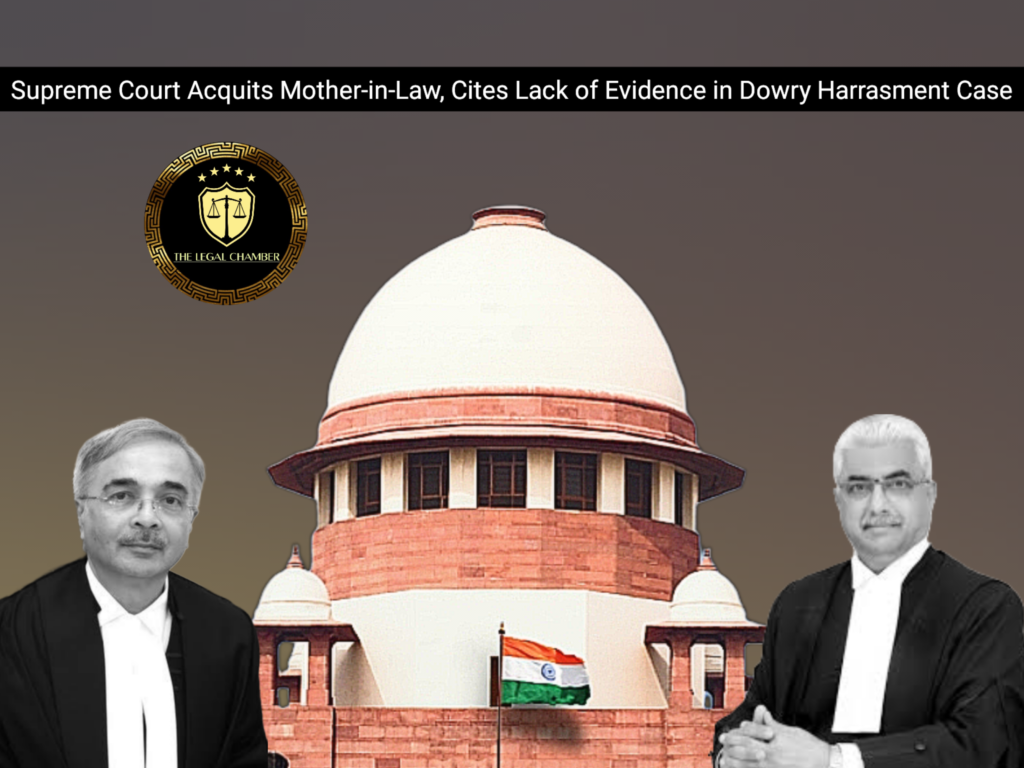
The Supreme Court acquitted the appellant of charges under Section 498-A IPC. It held that the conviction, based solely on uncorroborated testimony of interested witnesses, was unsustainable. The Court emphasized that cruelty under Section 498-A must be proven by continuous or persistent conduct likely to drive a woman to suicide, which was not established by the prosecution evidence.
Facts Of The Case:
The case originated from the death of Chandra Devi, who was found deceased in her matrimonial home on June 15, 2001. Her father, Dharmanand Joshi (PW-1), filed a complaint the next day, alleging that his daughter had committed suicide by hanging. He reported seeing wounds on her body and expressed suspicion about her death, stating that the deceased had previously told him her mother-in-law, Smt. Bhagwati Devi (the Appellant), made sarcastic comments demanding more dowry. Consequently, an FIR was registered under Sections 498-A and 304-B of the IPC against the appellant, her husband, and their other son. The Trial Court acquitted all accused for the major offences under Sections 302 and 304-B IPC. However, it convicted only the appellant, the mother-in-law, under Section 498-A IPC, relying on the testimonies of the deceased’s mother (PW-3) and brother (PW-2) regarding dowry harassment. The High Court upheld this conviction. The appellant then appealed to the Supreme Court, challenging the conviction on the grounds that it was based solely on uncorroborated statements of interested witnesses with no independent or medical evidence.
Procedural History:
The procedural history of this case commenced with the filing of an FIR for offences under Sections 498-A and 304-B of the IPC. The Trial Court acquitted all accused, including the appellant, for the offences under Sections 302 and 304-B IPC but convicted the appellant alone under Section 498-A IPC. Aggrieved by this conviction, the appellant filed Criminal Appeal No. 174 of 2003 before the High Court of Uttarakhand, which, vide its judgment dated 10.04.2014, affirmed the conviction and sentence. The appellant then challenged this affirmation by filing the instant Criminal Appeal No. 2616 of 2014 before the Supreme Court of India, which culminated in the judgment of acquittal.
READ ALSO:Supreme Court Relief for Companies: Tax Exemption for Vehicles Confined to Plant Premises
Court Observation:
The Supreme Court observed that the conviction under Section 498-A IPC was based solely on the uncorroborated testimonies of the deceased’s mother and brother, who were interested witnesses. Their evidence was found to be inconsistent, as they admitted that no specific dowry demand was ever communicated to them by the deceased during her visits, and that the marital life was initially happy. The Court emphasized that to establish “cruelty” under Section 498-A, the prosecution must prove persistent conduct of a grave nature that is likely to drive a woman to commit suicide, which was absent. It also noted that the testimony of an independent witness, the appellant’s neighbour (DW-1), who stated no dowry demands were made, was erroneously discarded by the lower courts. Consequently, the evidence on record was deemed insufficient to sustain the conviction.
Final Decision & Judgement:
The Supreme Court allowed the appeal and set aside the judgments of the High Court and the Trial Court. It acquitted the appellant, Smt. Bhagwati Devi, of the charge under Section 498-A of the Indian Penal Code. The Court held that the prosecution failed to prove the essential ingredients of the offence, as the evidence of cruelty or dowry demand was neither credible nor corroborated. Her bail bonds were discharged, and no order was made as to costs.
Case Details:
Case Title: Smt. Bhagwati Devi vs State of Uttarakhand Citation: 2025 INSC 1051 Criminal Appeal No: Criminal Appeal No. 2616 of 2014 Date of Judgement: August 29, 2025 Judges/Justice Name: Justice Aravind Kumar and Justice N.V. Anjaria
Download The Judgement Here